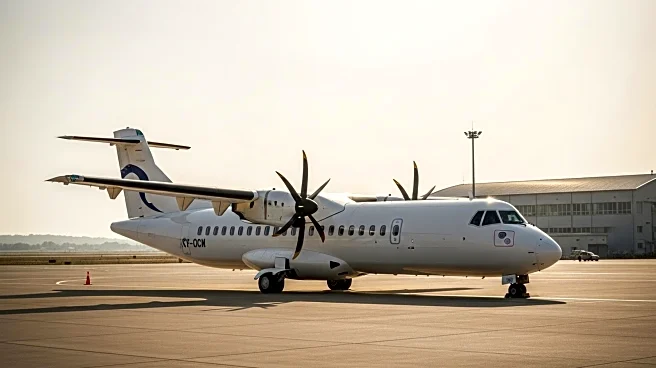What's Happening?
Scandinavian airline Braathens has announced a strategic shift in its fleet operations, opting to phase out its Airbus single-aisle twinjets in favor of expanding its ATR 72-600 turboprop fleet. This decision follows a comprehensive review of its operations, leading to a focus on regional wet-lease and charter services within the European aviation sector. The transition involves the gradual withdrawal of seven Airbus A319 and A320 aircraft by 2027, coinciding with the expiration of existing commercial agreements. Braathens aims to align its fleet strategy with future market demands, seeking long-term profitable growth. The company has historically operated Airbus jets through its Braathens International Airways division, primarily for leisure charters, but these aircraft are deemed suboptimal for both tour operators and regular airlines.
Why It's Important?
Braathens' decision to concentrate on ATR wet-lease services reflects a significant shift in its business model, potentially impacting the European aviation market. By moving away from Airbus jets, Braathens is positioning itself to better meet the demands of regional airlines and tour operators, which could lead to increased competition in the wet-lease sector. This strategic realignment may also influence staffing levels, as the company is in discussions with unions to address potential workforce changes. The move underscores the importance of fleet optimization in achieving profitability and adapting to market needs, which could serve as a model for other airlines facing similar challenges.
What's Next?
Braathens plans to complete the phasing out of its Airbus fleet by 2027, aligning with the expiration of current agreements. The company is engaging with unions to manage the impact on staffing, aiming to retain affected employees where possible. As Braathens transitions to a more streamlined operation, it will focus on expanding its ATR fleet to enhance its wet-lease offerings. This shift may prompt reactions from competitors and partners in the aviation industry, potentially influencing market dynamics and service offerings.
Beyond the Headlines
The decision to phase out Airbus jets in favor of ATR turboprops highlights broader trends in the aviation industry, where airlines are increasingly prioritizing cost-effective and flexible fleet solutions. This move may reflect a growing demand for regional and charter services, driven by changing travel patterns and economic conditions. Additionally, the shift could have implications for aircraft manufacturers, as airlines reassess their fleet compositions to align with profitability goals.











